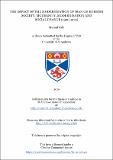Files in this item
The impact of the modernisation of Iran on Kurdish society : modernity, modernisation and social change (1920-1979)
Item metadata
| dc.contributor.advisor | Ansari, Ali M. | |
| dc.contributor.advisor | Talajooy, Saeed | |
| dc.contributor.author | Cabi, Marouf | |
| dc.coverage.spatial | x, 336 p. | en_US |
| dc.date.accessioned | 2019-06-05T11:06:40Z | |
| dc.date.available | 2019-06-05T11:06:40Z | |
| dc.date.issued | 2019-06-27 | |
| dc.identifier.uri | https://hdl.handle.net/10023/17817 | |
| dc.description.abstract | This PhD study examines the consequences of modernity and modernisation for Kurdish-Iranian society in the twentieth century. It identifies a dual process of socio-economic transformation and homogenisation of culture and identity, the dialectics of which (re)formed the economic, social, political and cultural structures of modern Kurdish society in Iran. As a result, socio-economically, Kurdish society became integrated in modern Iran, whereas it vigorously resisted homogenisation of identity and culture; at the same time, it maintained porous cultural borders with other societies in Iran, and continued to be shaped by mechanisms of modern cultural encounters. The socio-economic transformation of Iran strengthened and created new bonds between societies in Iran, while at the same time resistance and struggle for political and cultural rights became permanent characteristics of Kurdish-Iranian society. During the modernisation of Iran, the era of the ‘White Revolution’ is distinguished for the profound transformation of Iran it entailed. Therefore, an interpretation of the era constitutes the main concern of this thesis because, building on previous attempts to modernise Iran, the era of the White Revolution was crucial in engendering profound changes in Kurdish society. The theoretical framework of this study is informed by theories of social change and transformation against modernisation theories, and by theories of nation and nationalism which theoretically enable this research to distance itself from national narratives. Significantly, this framework includes a range of cultural critiques, benefits from studies of homogenisation and state formation, and relies on rich scholarly works on the formation of modern Iran, which, when combined, accentuate the cultural, political and social dimensions of modern nation-building in Iran. The result is a multi-dimensional approach to social change in Kurdish society. It is the dynamics of the dual process which continue to (re)form the foundations of Kurdish society in Iran; and it is this approach which I regard as a crucial contribution to both Kurdish and Iranian studies. | en_US |
| dc.language.iso | en | en_US |
| dc.rights | Attribution-NonCommercial-NoDerivatives 4.0 International | * |
| dc.rights.uri | http://creativecommons.org/licenses/by-nc-nd/4.0/ | * |
| dc.subject | Kurds | en_US |
| dc.subject | Kurdistan | en_US |
| dc.subject | Modernity | en_US |
| dc.subject | Modernisation | en_US |
| dc.subject | Social change | en_US |
| dc.subject | Iran | en_US |
| dc.subject | Homogenisation | en_US |
| dc.subject | The White Revolution | en_US |
| dc.subject | Gender | en_US |
| dc.subject.lcc | DS269.K87C2 | |
| dc.subject.lcsh | Kurds--Iran--History--20th century | en |
| dc.subject.lcsh | Kurds--Iran--Social conditions--20th century | en |
| dc.subject.lcsh | Iran--History--20th century | en |
| dc.subject.lcsh | Iran--Social conditions--20th century | en |
| dc.title | The impact of the modernisation of Iran on Kurdish society : modernity, modernisation and social change (1920-1979) | en_US |
| dc.type | Thesis | en_US |
| dc.type.qualificationlevel | Doctoral | en_US |
| dc.type.qualificationname | PhD Doctor of Philosophy | en_US |
| dc.publisher.institution | The University of St Andrews | en_US |
| dc.identifier.doi | https://doi.org/10.17630/10023-17817 |
The following licence files are associated with this item:
This item appears in the following Collection(s)
Except where otherwise noted within the work, this item's licence for re-use is described as Attribution-NonCommercial-NoDerivatives 4.0 International
Items in the St Andrews Research Repository are protected by copyright, with all rights reserved, unless otherwise indicated.


